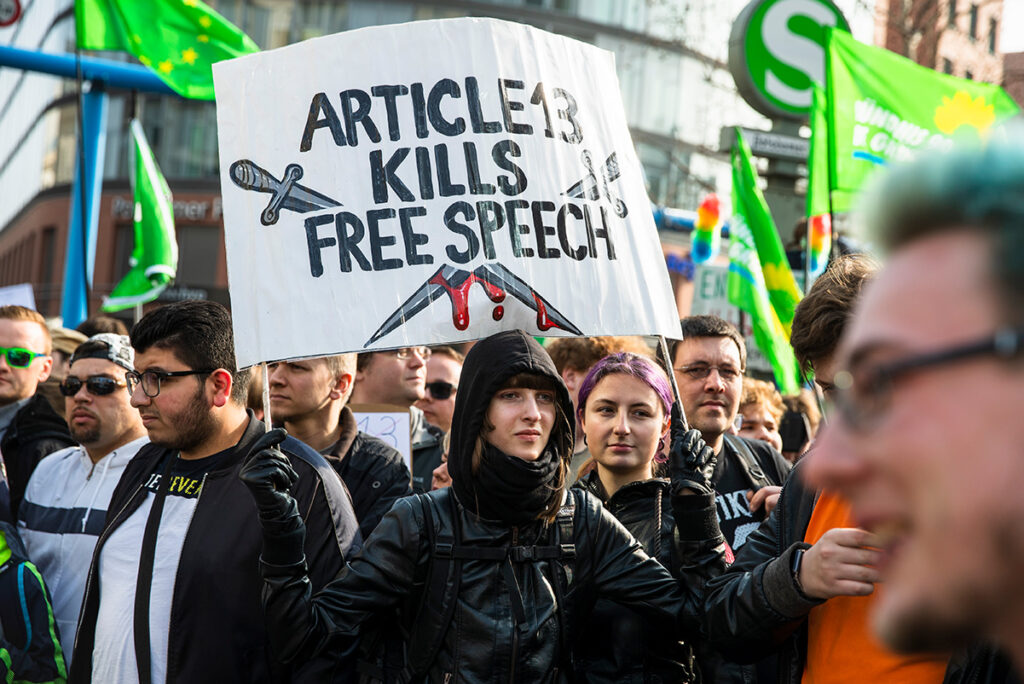On 12 March 2019, a few days before the decision of the EU Parliament, the Council of States referred the bill for the revision of Swiss copyright law back to the advisory Committee for Science, Education and Culture (CSEC) with instructions to take into account current developments in the EU.
Despite the carefully balanced compromise fostered in the Working Group on Copyright (AGUR) by Federal Councillor Sommaruga, Minister of Justice at the time, the copyright law revision is now threatened by further delays, not to mention the risk that special interests, which had been set aside as part of the compromise, may surface anew.
The main revisions in the EU Directive
The European Directive contains two fundamental improvements in copyright protection which are particularly controversial:
the liability of platform providers for the sharing of content uploaded by consumers
This provision mainly concerns the major social media platforms (Google, Apple, Facebook and Amazon, or GAFA for short). Under existing EU law, platform operators can argue that they are merely service providers and are not responsible for the content made available on their platforms. This position is rooted in the EU’s e-commerce directive of 2000, which had limited the liability of service providers (under what was termed the “safe harbour” principle) with a view to stimulating the digital economy.
In the meantime, it has been rightly recognised that the uploading of protected content by private persons infringes copyrights. Even providers such as Google have sought contact with major rights owners and collecting societies because of Youtube, but only offered financial compensation on a “voluntary” contractual basis. It is precisely because content-sharing platforms like Youtube make available practically all existing content that they are so popular with growing numbers of music and film enthusiasts.
Article 17 of the new Directive (Article 13 of the original draft) provides that EU Member States must enact rules stipulating that service providers are liable for the content shared (uploaded) on their platforms.
As a result, GAFAs will be obliged either to conclude licence agreements with all rightholders, or to introduce technical mechanisms (upload filters) to prevent altogether the uploading of protected content. It was this latter prospect which inflamed the Internet community and led to demonstrations in front of the EU Parliament against what was feared would lead to drastic restrictions on the freedom of expression and artistic freedom.
Protecting press publishers from the publication of their articles on internet platforms
Article 15 (formerly 11) of the new Directive also proved very controversial in the parliamentary debates. The proposed neighbouring rights protection was designed to grant publishers a participation in the dissemination of their content, e.g. on Google News. Interestingly, however, the simple reference to Google News can serve to increase a press publisher’s reach, and news per se cannot be protected by copyright. Similar regulations in individual EU countries have proved ineffective, particularly because major publishers prefer to benefit from free advertising on Google News rather than threaten Google News with a licence claim and risk being ignored.
The key points of the Swiss revision
Different legal situation compared to the EU
The Federal Copyright Act (FCA) and Switzerland’s legal situation are considerably different to EU law and the copyright legislation of the individual EU Member States. The EU Directive of 2000 on the single market is not applicable in Switzerland. GAFAs cannot invoke the “safe harbour” principle here. In principle, platform operators are already liable for the content shared by their users, but enforcing a liability claim is a complex and hazardous process. Switzerland’s copyright legislation also recognises the principle that, relying on private copying rules, consumers are entitled to use content from the Internet regardless whether or not the source is licensed to make it available. This liberal approach reflects the acknowledgement that only the provider can reasonably license the mass consumption of content from the Internet, certainly not the consumer.
The AGUR compromise
The AGUR compromise was adopted in March 2017 in the context of the Swiss legal framework described above. Relying on that compromise – which contained some grey areas disadvantageous to authors – the Federal Council submitted a revised bill to Parliament. The bill contained a “stay down” obligation designed to reinforce the liability of online content-sharing service providers: once content is qualified as illegal, providers must keep it off their platforms permanently. In addition to other important improvements for authors, which we have already reported elsewhere, the Federal Council’s proposal contains changes for digitisation, such as a “scientific” exception or limitation for text and data mining, and licensing simplifications through extended collective licensing. The last two proposals are also part of the recently adopted EU Directive (Articles 4 and 12).
Remuneration for journalists and neighbouring rights for publishers
On 12 February 2019, the Committee of the Council of States proposed to introduce an entitlement to remuneration for journalists and neighbouring rights protection for publishers whose work is used on Internet platforms. The introduction of an entitlement to remuneration for journalists would certainly be welcome, and might even suffice if journalists, as the original creators, would involve their publishers in the claims. This would avoid having to introduce a controversial neighbouring right with the dubious effect described above.
Exception for libraries
At the last minute, the Committee of the Council of States also proposed to exempt public libraries from the obligation to pay remuneration for the rental of works – a provision in force since 1993. Public libraries lobbied actively for this exemption; under the existing tariff, libraries do not have to pay a fee on the rental of works provided they charge an annual fee rather than individual fees when they rent out works. Whatever the case, the truth of the matter is that libraries make books, DVDs, CDs or music streaming available to their users for a small fee, in competition with the markets concerned.
Exception for reception in hotel and guest rooms
As with public libraries, the exception for guest rooms deviates from the AGUR compromise to the detriment of authors. Intensive lobbying by the hospitality industry had already led the National Council to propose an exception for the reception of programmes in hotel rooms and holiday flats in December 2018. Moreover, the exception was extended to rooms in institutions and prison cells. This demand also stems from a tariff dispute with the collecting societies. In 2017, the Federal Supreme Court ruled that the use of works in such premises did not qualify as private use if the hotelier or landlord arranges reception and makes the corresponding equipment available. In this case, both are acting with the intent of making a profit, i.e. the provision of reception facilities for protected content is a sales argument for landlords and influences their turnover. Artists should not be required to subsidise the hospitality industry through this exception; their situation would then be significantly worse than under existing copyright law.
Switzerland needs updated copyright legislation now – without any new exceptions!
Switzerland has been struggling to modernise its copyright law since 2010. The AGUR compromise made some progress in adapting the law to the contemporary environment. Individual interests that run counter to this modernisation are liable to emerge in parliamentary debates and may even lead to a worsening in the existing law. This must not be allowed to happen. The situation is somewhat different for journalists: the re-use of press products on the Internet must be seriously examined when the law is updated. Maybe the time is not yet ripe. This was also acknowledged by the Committee of the Council of States in its second consultation on copyright law on 29 April, and it called on the Federal Council, by way of a postulate, to examine the development of copyright law in Europe.
In its 2019 summer session, Parliament would be well-advised to adopt the copyright law revision on the basis of the AGUR compromise without any new exceptions for public libraries or the hospitality industry.
Cautious take-over and adaptation of the EU Directive to Swiss specificities
The new EU Directive could nevertheless serve as a model for additional changes to Swiss law in the future. As mentioned above, the CSEC of the Council of States has asked the Federal Council to produce a report on the situation of journalists and newspaper publishers in particular; in this context, the liability of online content-sharing service providers should be examined more closely. What is more, the sharing or uploading of protected content on the Internet is even less controllable than private copying. The EU Directive therefore rightly establishes a liability on the part of GAFAs, because they are the ones who make sharing possible and attractive in the first place. However, it will be difficult for GAFAs to license each uploaded contribution from the individual rightholders.
One option might be to oblige the platforms to remunerate rightholders on a lump-sum basis for the sharing of content on their platforms. Anything demanding unreasonable technical effort to control should generally be allowed; on the other hand, online content-sharing service providers would be obliged to compensate authors and other rightholders via the collecting societies under a legal licence similar to private copying. In the next few years, the Swiss Parliament will have to revisit these issues again in more depth with a view to implementing the EU Directive across the borders.
Post-revision is pre-revision
Swiss copyright legislation is likely to remain a work in progress for some time to come. Digitisation, the easy global exchange of protected works on the Internet, and technological advances such as artificial intelligence or machine learning mean that legal standards will have to be reviewed again. The current revision of Swiss copyright law, hopefully to be completed in June 2019 based on the AGUR compromise, is not final but merely the prelude to the next revision.




